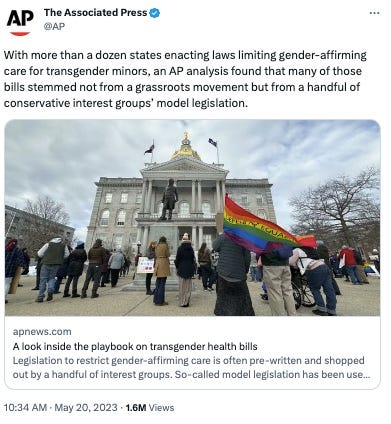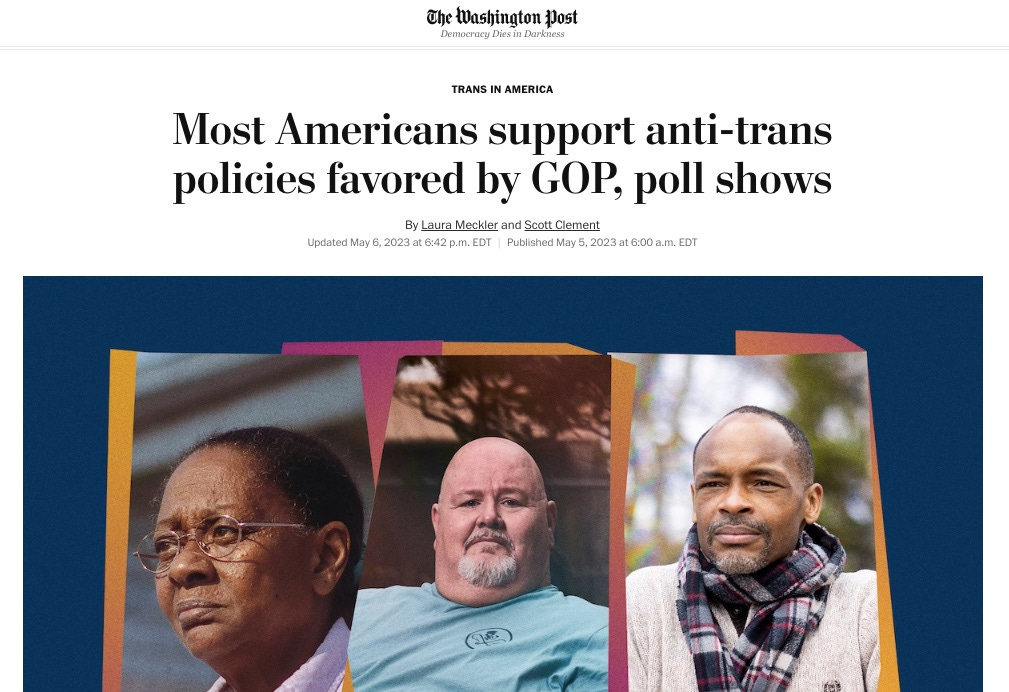Frame Game
How the corporate press spins the trans issue to avoid the truth, and the wrath of the Twitter mob
June 5, 2023
Dateline: The day we seemed to get closer to the truth about UFOs/UAPs on Earth
Watching this week…
— Media’ frame game around trans issue
— How Did This Get Published: Secretary Pete puff piece
— How much does cable news primetime matter?
— Steele dossier, Gawker legacy - Fourth Watch Pod with Ben Smith
— Great Moments in Political Board Games Journalism
Frame Game: How media spins the trans issue to avoid the truth — and wrath of the mob
On Thursday’s popular “The Daily” podcast, the episode begins with a great explanation about how we’ve found ourselves in 2023 having what seems like a seemingly-endless conversation about transgender rights and trans ideology. Following the Obergefell ruling in 2015 making gay marriage legal in America, major gay rights advocacy groups like the Human Rights Campaign and GLAAD were in a bit of a bind — gay marriage was their defining issue. In many ways, these organizations became the victims of their success. They won. As “The Daily” told it, now they needed a new mission to drive interest, and donations. Suddenly the focus shifted from gay rights to “transgender” rights, then the subsequent counter movement, and thus began the culture war we see playing out today.
This is an interesting, nuanced conversation about an important and complicated issue. The episode title? “How the G.O.P. Picked Trans Kids as a Rallying Cry.”
It does a disservice to the audience to put that completely ridiculous title out — that actually is undermined by the episode itself. So why do it? There are several reasons. But it is this framing of the story that leads us down a path of increasingly divisive media coverage that — intentionally or not — serves to further divide America.
I’ve written before about the trans ideology debate, beginning almost a year ago around the “Don’t Say Gay” DeSantis situation, and how it was a “convenient” culture war for both sides of the aisle (and both sides of the media). More recently, I explored how trans ideology gets inserted into stories by reporters with an agenda on this particular topic. The issue hasn’t subsided — it’s gotten louder and more hyperbolic. The clubhouse leader in emotion-driven hysteria around this issue is Chris Hayes of MSNBC, who has been tweeting about this incessantly.
I believe it will be the defining political issue in the 2024 campaign — and thus, the media’s coverage will be essential to driving the story, and framing it in a certain way.
Take a look at a recent framing of this issue by what used to be known as capital-J journalism, the Associated Press:
“Gender-affirming care.” The implication that it’s not “grassroots” but “conservative interest groups” driving this. And of course this isn’t an isolated incident. The New York Times recently got attacked internally and by activists over semi-fair coverage of the issue. They seemed to hold firm at the time, but take a stroll through the “gender identity” section on the website, and it’s clear they’ve gotten in line. Stories on “laws directed at young trans people.” Stories about how we don’t know how many LGBTQ Americans die by suicide.
The complicated topic of transgender issues is one Americans actually have some agreement on. A recent Washington Post poll found that 66% of all Americans favor not allowing trans girls to compete with biological girls in high school and college sports. 68% oppose puberty blockers for trans children under 14 years old. 70% say it’s inappropriate to discuss trans identity in elementary schools. In today’s deeply polarized culture, these are rare points of strong agreement.
But how were these Washington Post poll results framed… by The Washington Post? “Most Americans support anti-trans policies favored by GOP,” screamed the headline:
Oh I’m sorry, dear reader. You’re not “anti-trans” are you? You don’t support policies, gasp, “favored by the GOP”?! This frame game is how the corporate media lies to its viewers and readers — and, frankly, itself. And further alienates the audience.
Like most stories, the corporate press’ intention to cover this story in as nuance-free way as possible is in some ways by design. It’s easier to simply smear a group of people — even a large group of diverse people — in the service of signaling to a certain smaller, but louder, audience. But we also have to be honest about the particularly unique attributes this story has. What brings the fear and tiptoeing we see. It’s something I talked with Outsports Editor Cyd Zeigler on a recent Fourth Watch Podcast.
It’s Pride Month, so expect to see a few more weeks of this issue front and center. But don’t expect it to subside once July comes. The corporate press is all-in, and so fearful of crossing the Twitter mob and activist crowd it won’t deviate from the consensus orthodoxy on this issue while it’s a hot campaign topic.
The Acela Media’s decision to plant its flag firmly on the side of mischaracterization and being as hyperbolic as possible has made this challenging topic even harder to decipher. We often see subtle bias exhibited through the framing of a story. But for the public, this frame game is even more damaging because it’s one that requires an honest press to really dig into the complicated nature of it.
My advice to the news consumer as you approach this story — read beyond the headline. Listen beyond the episode title. There’s good journalism out there, even if it’s disguised behind a false frame. And don’t buy the media smears from those who put avoiding the wrath of the activist class ahead of the truth.
❓How Did This Get Published❓: Bizarre, fawning profile of Secretary Pete in Wired
There continues to be strange fallout over at the New York Times over the recent Elizabeth Holmes profile, as Vanity Fair reports there’s internal drama over the perception of the piece as too cozy to its subject. Holmes is going to jail, and the piece was quite transparent about the author Amy Chozick’s internal wrangling over whether she was being played by Holmes in the way Holmes’ investors and others were. By telling the story that way, it offered brilliant insight into what it’s like to be in the world of Holmes — and didn’t sacrifice journalistic credibility to do so.
Contrast that, for example, with a recent profile of Secretary Pete Buttigieg in Wired Magazine by Virginia Heffernan, which didn’t seem to garner any outrage by the media Twitterati. “Infrastructure occupies just a sliver of his voluminous mind,” it teases in the sub-hed:
Here’s part of the big wind-up, before we even get an answer from Pete: “As Secretary Buttigieg and I talked in his underfurnished corner office one afternoon in early spring, I slowly became aware that his cabinet job requires only a modest portion of his cognitive powers. Other mental facilities, no kidding, are apportioned to the Iliad, Puritan historiography, and Nausgard’s Spring—though not in the original Norwegian (slacker). Fortunately, he was willing to devote yet another apse in his cathedral mind to making his ideas about three mighty themes—neoliberalism, masculinity, and Christianity—intelligible to me.”
“His cathedral mind”! The actual interview itself is joke. At one point Heffernan notes that "running the department of transportation suits you,” but asks: “Are there ways the challenges of transportation speak to your spiritual side?"
You’re not going to believe it, but yes, indeed it does. “There’s just a lot in the scriptural tradition around journeys, around roads, right? The conversion of Saint Paul happens on the road,” says Pete, to a rapt interviewer, to be sure. “I think we are all nearer to our spiritual potential when we’re on the move. Something about movement, something about travel pulls us out of the routines that numb us to who we are, to what we’re doing, to everything from our relationships with each other to our relationships with God. That’s part of the reason why so many important things in the Bible happen on highways."
It’s pointless to point out how a GOP politician would never get this treatment. But this embarrassingly fawning profile is one of the most glaringly hypocritical in recent memory.
A few days ago it was announced the editor of Wired would be leaving. It makes sense, because my first question to him if I had a chance to talk with him would be… how did this get published?!
Steele Dossier, Trump Coverage, Gawker’s Legacy — Fourth Watch Podcast with Ben Smith
I think Ben Smith’s decision as editor of BuzzFeed to publish the Steele dossier in full was the perfect representation of the uniqueness of the media’s Trump Era coverage. It will be a media moment to remember for decades to come.
I’ve always enjoyed talking with Ben, who I find fairly introspective and generally game to have a spirited discussion amid strong disagreement. I recently had one of those with him for the latest episode of The Fourth Watch Podcast. You can download the show on Apple, on Spotify, or wherever you get your podcasts.
We talked a lot about his new book, “Traffic: Genius, Rivalry, and Delusion in the Billion-Dollar Race to Go Viral,” which focuses on BuzzFeed and Gawker specifically but really a deep dive on a very specific era of digital journalism that is mostly over.
Here’s the video clip that goes through most of our 15-minute Steele dossier and Trump Era journalism discussion. And another video clip, on why the Gawker ethos has mostly disappeared as the alumni have become boring consensus pushers (my take).
Cable news primetime is changing at Fox News and CNN — will it work, and will it matter?
There has been a lot of cable news news recently — with the mammoth The Atlantic profile of CNN CEO Chris Licht’s first year at the helm, which granted extraordinary access to show Licht’s vision (which I agree with) and internal headwinds. Then Jeff Zucker fired back (in a way), and the drama has continued this week. Meanwhile Drudge recently took a rare opportunity these days to break news himself when it came to Fox News’ new primetime schedule, describing it as the “BOLDEST AND MOST FEARLESS LINE-UP EVER.”
Ultimately these two stories intersect, because Licht’s big pending move is Kaitlan Collins going to primetime at 9pm, expected to launch later this month. The once-a-week “King Charles” Gayle King-Charles Barkley collab will debut also soon in that slot. It would stand to reason Licht has a lot riding on whether 9pm can become a win in driving cultural conversation, if not also ratings hit.
And then if Drudge is right — and we don’t know yet — Fox is moving on from Tucker Carlson by reshuffling some of its top talent into primetime: Hannity to 8pm, Jesse Watters presumably to 9pm, and Greg Gutfeld presumably to 10pm. Watters is probably the closet to the ethos of Tucker, but none of it feels particularly outside the box.
So the question is… does it matter? Tucker Carlson mattered. There’s a baseball term called WAR, or wins above replacement. It’s not to diminish any of the talent mentioned in this section, who are all skilled broadcasters. What is their WAR? How much does it actually matter to the Nielsen ratings, to the bottom line, to the cultural cache, what happens in primetime on traditional, over-the-top cable news?
The Washington Post’s Paul Farhi recently wrote about the “looming existential crisis for cable news.” For CNN, 9pm needs to provide steadiness, and “buzz” — even if the ratings don’t improve drastically. But it also needs to provide the anchor for being “news” — a trust factor that imploded during the Trump years. For Fox, it needs to improve the ratings from the post-Tucker lull, to be sure, but it also needs to re-commit to the audience.
In 2023, as the media landscape continues evolving and the monoculture continues evaporating through massive fragmentation, the answer to the primetime question is no longer clear. And whether there are even major needle-moving moves to be made is no longer clear as well.
WATCH IT… An absolutely incredible 11-minute supercut from “Orf” highlights the insane ways the media and Democratic politicians discussed “the unvaccinated” and much more. The best part? The lengthy section on celebrities, sports announcers and, yes, the corporate press, getting mad at people for daring to “do your own research.”
HEAR IT… “What Does Healthy Masculinity Look Like?” is a compelling title for a podcast, and the discussion between the four New York Times opinion contributors is a fantastic episode. I’ve been intrigued by the new “Matter of Opinion” podcast, which took the place of the excellent “The Argument” podcast, so I’ll keep checking it out as it continues past episode three.
READ IT… The Wall Street Journal’s Jeffrey Epstein reporting has been impeccable, and the latest entry, on what seems like a pretty clear case of Epstein attempting to blackmail Bill Gates over Gates having an affair with a Russian bridge player a decade ago, is another fascinating story. Gates’ representative basically admits it. We’re learning more about Epstein — but it still feels like the tip of the elite iceberg.
QUICK HITS
The Daily Wire is bringing all its video podcasts to Twitter, in addition to YouTube and other platforms. Although it got off to a rocky start.
Fascinating, and fair, look at the new media outlet The Messenger, and its founder and CEO Jimmy Finkelstein, in Vanity Fair.
Good story in The Federalist about a recent poll that shows the extent to which the media has lost the trust of the public.
Great reporting by Glenn Greenwald on his Rumble show about the funding behind Bellingcat, the “journalism” outlet at the center of a variety of new reporting.
Interesting Variety story on how the NBC Nightly News with Lester Holt is experimenting with the format to provide a local news focus
Content has slowed because of the writer’s strike. So, when will it end? Vanity Fair gives some possible conclusions — but it’s not promising.
Can Ozempic help you quit… everything? A fascinating, but not totally convincing, report in The Atlantic on the weight loss drug that could stop all addiction.
⏪ REWIND // FAST FORWARD: Casey DeSantis Edition ⏩
⏪ Politico’s bizarre recent Casey DeSantis hit piece broke the publication’s own rule about the “Lady Macbeth trope.”
⏩ Even Joan Walsh at The Nation, who writes that she “despises DeSantis,” had to call out the piece, noting the piece is “naked in its sexism while insisting that it’s in fact giving the woman in question agency, credit, attention.”
MORE TK…
How much of what you see from the press is “right place, right time”… and how much is manufactured? That’s what I was thinking while I read HotAir’s Ed Morrissey’s fascinating dissection of an indictment that seems to indicate two Washington Post journalists conspired with some climate extremists to attack the National Gallery of Art. A Washington Post reporter, and, even more interestingly, photographer, got the scoop last month. But as the indictment makes clear, it appears they got alerted to this crime before it happened, so that they could capture it when it did — and now they might get charged themselves.
GREAT MOMENTS IN JOURNALISM
If a board game gets designed in the forest, and no corporate media journalist is there to cover it, does it make a sound? Anyway, enjoy this surely very fun climate change game, coming soon…
Thanks for reading. I know you all got less content in May than usual. Busy month, but that’s on me. June will be better and back on track!
—Steve






I suppose what gives me heart is that even with all the spin, so many people see the truth.
Thank you for a great roundup. I always find something unique. Though the "climate change" game cost me a bit of enamel off my teeth.